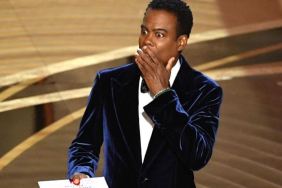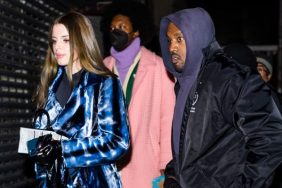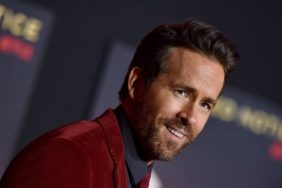Brian Helgeland knows crime movies, and he’s got the Oscar to prove it. The co-writer of the 1997 classic L.A. Confidential and screenwriter of the acclaimed 2003 drama Mystic River returns behind the camera this year with Legend, a new biopic of the infamous twin brothers who rampaged through England in the 1960s. It’s also the second biographical film in a row for Helgeland, whose previous hit film 42 chronicled the life of heroic baseball player Jackie Robinson.
In short, he’s got this. He knows how to write, how to direct and how to craft a film based on criminal lifestyles and real-life events. So it was with the utmost respect that I sat down opposite Brian Helgeland in the Café Boulud at the Four Seasons in Toronto shortly after he premiere of Legend. We talked about directing Tom Hardy in two roles, the dangerously unstable Ronnie Kray and the merely dangerous Reggie Kray, his advice for aspiring screenwriters, and what might have come of his The Wild Bunch remake if the film’s director, Tony Scott, had not committed suicide in 2012.
Originally scheduled for October 2, Legend will now arrive in theaters on November 20, 2015. [Updated]
Related: TIFF 2015 Review | Tom Hardy is Kray-Kray in ‘Legend’
Crave: Normally I would never ask anything this gauche, but who is harder to work with… Tom Hardy or Tom Hardy?
Brian Helgeland: Ron is the easiest person in the world to work with.
Really? That would seem to be the unexpected answer. Why is that?
I don’t know! He would arrive on set and be very garrulous and friendly and always had his arm on my shoulder, and wouldn’t ask any questions. “What are we doing?” “We’re doing this.” “Okay.” And Reggie would arrive and not [be] difficult but just standoffish. Ron would be in the thick of things and Reggie would be off to the side, watching everybody, the crew included. When he was Ron he was very friendly with everybody, the crew included. But just quiet as Reggie, and less approachable in a way.
I was mostly joking. Was Tom Hardy very method on this movie? Did it help him keep the characters straight?
No, he’s not method. You don’t call him by his character name, silly things like that. But he’s very focused and, you know, if a phone call came from his house saying “We can’t find this and that” he can tell them. It’s not like it ruins him. But he’s very focused and we had a very short schedule, so he was always there, ready to go, and he had to go from one character to the next within an hour sometimes. So yeah, I wouldn’t call it method because when the day was done he would drop the whole thing and he would just be Tom again, say goodbye, see you tomorrow morning, and that’s how the morning would start. But he’s just focused, much more than I would say method.

Universal Pictures
Was using the same actor for both Reggie and Ronnie a necessity of needing a star, or was that always part of the plan?
The great thing about a film for me is that it just gets bitten off piece by piece by piece. Reggie was the lead so I knew at the very least you cast the lead first in a film. Obviously it’s a possibility, there’s a tradition of one guy playing two parts, but I didn’t know that he necessarily wanted to do that, the actor that played Reggie. You don’t know that they want to play both brothers even. So I just went from “Let’s get Reggie first and see where we end up.”
And I met Tom, he had read the script, and he was very keen on Ron. That’s all he talked about. And I’m trying to steer him towards Reggie, and we were looking at each other, sort of sizing each other up. He basically, at the end of the dinner, he said, “I’ll give you Reggie if you give me Ron.” His attitude towards Ron was he wasn’t going to let anyone else have him. That’s where the decision was made that he play both.
“I think it’s a bit of an urban fairy tale, in a way.”
It’s an interesting way to film a movie. When other movies have done this in the past – whether they’e done it really excellently like in Dead Ringers, or whatever – it’s hard not to get the sense that the filmmakers are kind of showing off a little bit.
Yeah.
“Looking at how seamless we can make this.” How much of that is there?
In our case we didn’t want it to become a gimmick if we could help it. From the time the decision was made all we worked on was how to make it go away. The alternative being cast Tom as Reggie, and then immediately your casting is limited to someone who looks like Tom, and there’s a lot of guys who can’t do it all of a sudden. So it’s a necessary gimmick in a way.
Especially camera-wise, we tried to make the camera never aware that it was two Toms. We don’t try to do anything really fancy, going from this face across the room to this face, to say “Hey, look at how cool we can do this.” But at the same time when they’re in the frame together we have to do our best to not make it obvious.
What was the hardest shot or sequence to pull off, in that capacity?
I’m just trying to think because there were some little things that were very hard to pull off. Just when they sat together at the end, at the party, because Ron uses Reggie’s knee to get up and down from his chair, which was very tricky as silly as it sounds. The fight was difficult but it was not as difficult as it looks because we covered a lot of it with angles and with clever, following one away from the other so we could find a place to cut, so we didn’t have to do anything. Tom’s stunt double’s in there for a lot of it. The eye just doesn’t go to his face. But probably that was the most complicated because it was the longest, and it’s the one place where we used face replacement.
What was it about The Krays? They’ve been turned into a film before.
Yeah, and fifty books have been written about them.
“[The Krays] don’t go away. It’s a bit like Jane Austen. They won’t die.”
So what did you feel like you could contribute to their story?
I think I was as fascinated by them as everyone else appears to be, because they don’t go away. It’s a bit like Jane Austen. They won’t die.
I’d like to see your Jane Austen movie.
[Laughs.] I was fascinated by how little truth is known about them. It’s not like they’re from the 17th century and no one knows. Reggie died fifteen years ago and yet so little is really known about them and it’s all been turned into mythology. They were angels, they were demons, they were all that and I found that a very interesting, fertile ground to enter. I thought, in my case, I thought a lot that Frances in a lot of ways was a ghost in that story, and I was just interested in approaching it from her angle.
It’s funny, when a film comes out everyone says, “So you have the truth about this?” and I don’t think anyone has the truth about it. We have no more truth than anyone else except I tried to find a center, a bit, for the characters as opposed to just they’re villains or they’re heroes. But I think it’s a bit of an urban fairy tale, in a way.

Warner Bros.
I noticed that in 42. There’s an element of history but you weren’t shying away from the legend of Jackie Robinson. You were selling it. This is how Jackie Robinson is remembered, and you’re saying that that has a certain historical validity.
In this story especially, in Legend, which is part of why it’s called Legend.
Plenty is known about Jackie Robinson. There’s massive biographies. The thing about Jackie Robinson is he did do all that stuff. I didn’t invent anything. In that movie even the gameplay is all from real games and his at bats are real at bats. Not to digress but you hard trouble trying to bring Jackie Robinson down to earth. For example, myself and Chad [Boseman], we were amazed at the reality of him. He was that guy in a lot of ways. He was that brave. He never broke. His wife said he never broke and his teammates say he never broke. The scene where I had him break I had to invent, there in the tunnel. If I’m going to show what this toll took on him I have to do it when he’s alone because no one ever saw it.
I was going to ask you, I’m glad you brought it up, why this is called Legend. My first thought when I heard about this project was, “Oh, Brian Helgeland’s remaking Legend?”
Right. [Laughs.]
Was that ever a concern? Are we just out of titles?
No, I mean Legend is a fairly generic title and that Ridley Scott movie… it’s not like I called it Blade Runner. It’s not a cherished…
I liked it, but whatever.
I liked it too but I’m just saying in the Ridley Scott canon it’s not the one that everyone always brings up. Gladiator and Legend…
Fair enough.
But the first photo I saw was a photo of Reggie Kray’s hearse, and in carnations six feet across was the word “Legend,” and that’s where I first got that title from.
That image had to have been in the script at one point. Did you have that, to clarify it?
No, because I never had his funeral or anything like that. But I just thought, “legend,” that’s what his people, his fellow gangsters, that’s what they wanted. Because they paid for it all. That’s what they wanted on his hearse.

Warner Bros.
So I gotta ask, you wrote a draft of… or are you still writing the remake of The Wild Bunch?
The day Tony Scott died I was working on that script. I was on page 46 the day he jumped off the bridge, and I’m still on page 46. That was me and Tony’s thing and I wouldn’t ever do it without him.
Do you mind if I ask what your idea was? How do you make the freshest western ever fresh again?
It was a modern version, and it was four Rampart cops who were all going to prison, and they’re waiting for their trial for planting evidence and sending guys to jail, and they know they’re going to jail and one of their younger partners had left and gone and become a DEA Agent. They’re all suspended and sitting around one of the guys’ houses waiting to go to jail and he comes up and tells them about this bank down in Mexico that has all this money in it, drug dealing money, and they decide to go down to Mexico and rob the bank, and then go to Baja and find a boat and get lost somewhere. And they all die.
“The day Tony Scott died I was working on [The Wild Bunch]. I was on page 46 the day he jumped off the bridge, and I’m still on page 46.”
Of course, it’s The Wild Bunch. That would have been a really interesting film to come out now, turning the corrupt cops into the heroes. That would have been fascinating.
Yeah.
I’m disappointed I don’t get to see that film. What is next for you, as a director for example?
I don’t know. I’m not like a lot of directors. I don’t have a company, I don’t have development people who are trying to put projects together for me and scripts. I’ve been working on this [Legend] for two years and I have a big gap as far as, I have nothing that’s ready to go. I don’t have a script I’ve written. I don’t do other people’s scripts, so short answer: I don’t know. [Laughs.]
Your last two films in a row have been biopics. Is this your phase? Do you have to complete the trilogy? Who else interests you?
I’ve written three biopics. One is unproduced, and that’s the story of Shep Messing, the goalie of the New York Cosmos in the 1970s. I don’t know what else to say about it than that. It’s the Shep Messing story, whom no one’s ever heard of as opposed to the last two.
I haven’t heard of him. What about him is so interesting?
He was the American goalie on one of the greatest international soccer teams ever put together. It was when they tried to make a Soccer league in the States in 1977, and Pelé came out of retirement. It’s a very specific time and place and a very funny story. A bit Slapshot-y. But I don’t think that’s going to get made either. That’s at Sony. That’s been there a long time.
“The first script I ever sold was my seventh script. If I had written five and given up I would say I gave it a good shot.”
Do you have any specific, hard-earned lesson or advice about writing a film that maybe you don’t always see in the books?
I think it’s that you have to soldier on and keep writing. In metaphors, the chances of a script being found, being nurtured by producers, being shepherded into production, getting made, are less than the opposite, of nothing happening with it. Weirdly, every time you write a script, if it’s a slot machine you get another pull on the slot machine.
Joel Silver used to have a funny [metaphor.] I worked for him in the Nineties quite a bit. Not even a screenwriter, but when a director or another producer would be taking this one script all around, he would always liken it to Mrs. Havisham in Great Expectations with her wedding cake. He would do this whole imitation of “Here’s my wedding cake” and walk around, and no one wants it. You’re always better off having two wedding cakes than one.
I knew a lot of screenwriters who get… you do your best and you write the script and you love it, but you have to be prepared to abandon it in a way, and move on to the next one. It’s that. It’s to not give up. It’s a very long way of saying not to give up, but you write one and you write another one. The first script I ever sold was my seventh script. If I had written five and given up I would say I gave it a good shot. Do you know what I mean?
What was the first script you ever sold?
It was 976-EVIL.

New Line Cinema
Oh, no kidding!
[Laughs.] And it got made!
Yeah it did! That’s awesome.
I hadn’t written seven horror scripts but I’d written six scripts and I thought, you know what? I’ll take a shot at writing a horror script.
It seems like you’re so prolific, and those are just the scripts that got made…
Right.
Are there particular films or projects that are closest to your heart?
Yeah, I wrote a script called Finestkind that I really loved. [It’s] a story about two brothers who are fishermen on the east coast, in Massachusetts because that’s where I was raised. I know a lot about that world. I fished a little bit in college. But I’ve never been able to get that going. I have a script that, again Sony owns it, called Sidney Grimes that I really like a lot. A very small, low-budget crime story. But yeah, those are the two I would say.
Otherwise, I just keep rolling along, you know? I don’t write for directors much anymore because all the ones I most wanted to work for are either retired or dead.
“I don’t write for directors much anymore because all the ones I most wanted to work for are either retired or dead.”
So it’s all you. You get to hoard your own talent.
Well, what little there is of it, yeah! [Laughs.] I just keep working, and I’ve been at it long enough that there’s a body of work. I’m not turning out 25 scripts a year.
It’s just interesting to me. People think that I’m really prolific. I don’t feel prolific. I put out ten, fifteen articles a week and people ask me where I find the time. Like, I don’t know, I don’t do much else…
It’s my work! So I do my work.
So I admire that. I think that’s great.
Same to you. And you know, you have different things under construction and they all might come up at the same time, or whatever it is. But a writer writes. You’re compelled to keep at it and all those things.
Top Image via Universal Pictures
William Bibbiani (everyone calls him ‘Bibbs’) is Crave’s film content editor and critic. You can hear him every week on The B-Movies Podcast and watch him on the weekly YouTube series Most Craved and What the Flick. Follow his rantings on Twitter at @WilliamBibbiani.
The Best of TIFF 2015 | Exclusive Reviews, Interviews and Videos
The Best of TIFF 2015: Exclusive Reviews, Interviews and Videos
-
'The Martian' Sciences All The Science

Matt Damon stars in an outer space thriller by nerds, for nerds. The rest of us can enjoy it too.
Image via 20th Century Fox
-
Brian Helgeland on ‘Legend’ and ‘The Wild Bunch’

The Oscar-winning filmmaker reveals which Tom Hardy was hardest to work within a film that stars two of them.
Image via Universal Pictures
-
'High-Rise' is an Impressive Erection

An insulated community gradually collapses into anarchy and horror in Ben Wheatley’s slimy J.G. Ballard adaptation.
Image via Recorded Picture Company
-
Denis Villeneuve on 'Sicario' and 'Blade Runner 2'

The filmmaker promises to 'take care of' the mystery of whether Deckard is a replicant or a human in his next film, the long-awaited follow-up to Blade Runner.
Image via CraveOnline
-
'The Boy and the Beast' is Best of the Fest

Mamoru Hosoda’s unique and brilliant animated fantasy could very well fill a hole in your soul.
Image via Mongrel Media
-
Chiwetel Ejiofor on ‘The Martian’

He can about playing a super nerd, but he cannot talk about playing a supervillain (yet).
Image via CraveOnline
-
Tom Hardy is Kray-Kray in 'Legend'

Tom Hardy plays identical twin organized crime bosses, but only one of them well, in Brian Helgeland’s uneven biopic.
Image via Universal Pictures
-
'The Danish Girl' Flakes at the End

Eddie Redmayne and Alicia Vikander give soaring performances, but this Oscar contender lands with an unexpected thud.
Image via Focus Features
-
'Mustang' Isn't Just Turkey's 'Virgin Suicides'

A promising new filmmaker explores the repressions five sisters undergo when they’re accused of sexual indecency.
Images via Cohen Media Group
-
Drew Goddard on 'The Martian' and 'Sinister Six'

"It was the epic Spider-Man movie of my dreams," says the acclaimed writer/director.
Image via CraveOnline
-
'Body' Makes You Laugh Without Knowing Why

Corporeality haunts three characters in this masterful Silver Bear winner from director Małgorzata Szumowska.
Image via Nowhere
-
'Green Room' Has Strong Fear on Tap

Jeremy Saulnier's neo-Nazi thriller is a worthy follow-up to Blue Ruin.
Image via A24
-
Superb Satire in 'Chevalier'

The Greek New Wave demands to be viewed with this comedy about hyper-competitiveness turning men into horse's asses.
Image via Faliro House Productions
-
'Sicario' Borders on Greatness

From the director of Prisoners comes a gripping episode of narcs and violations.
Image via Lionsgate








